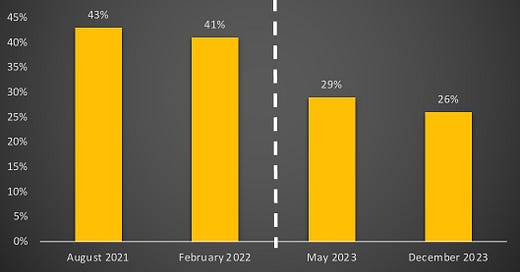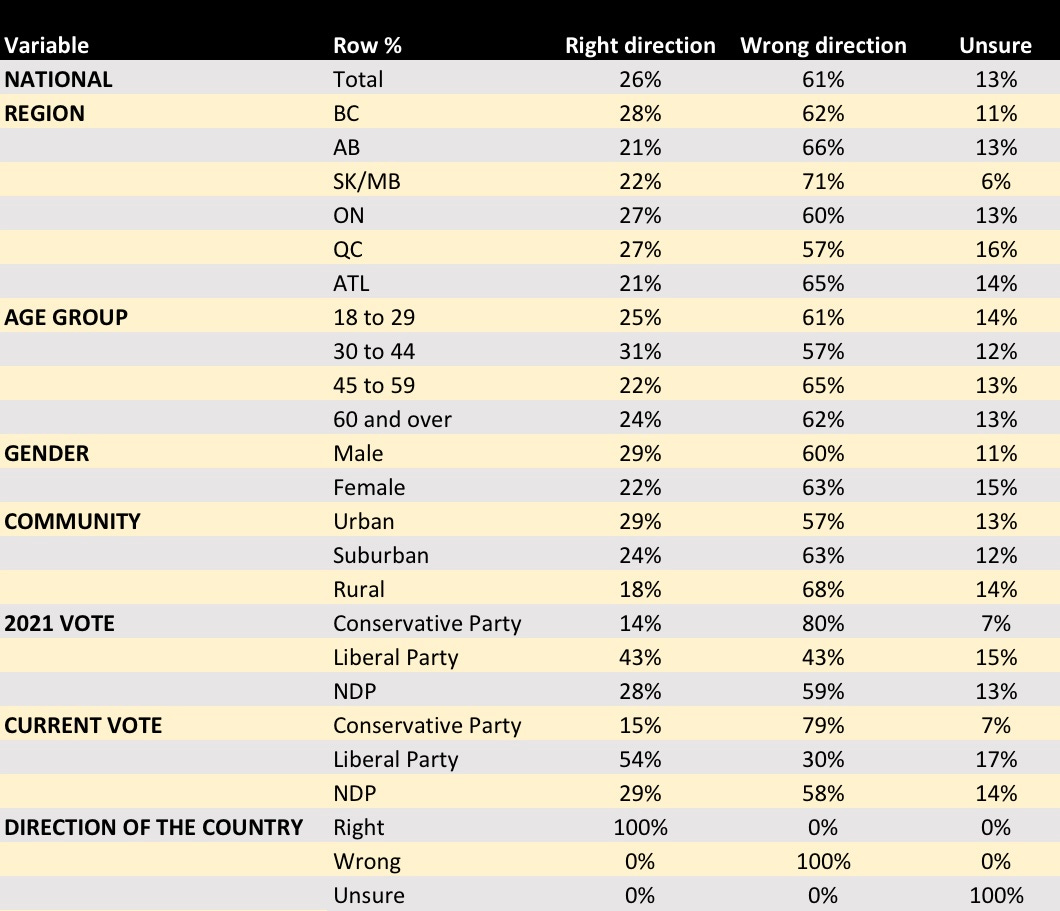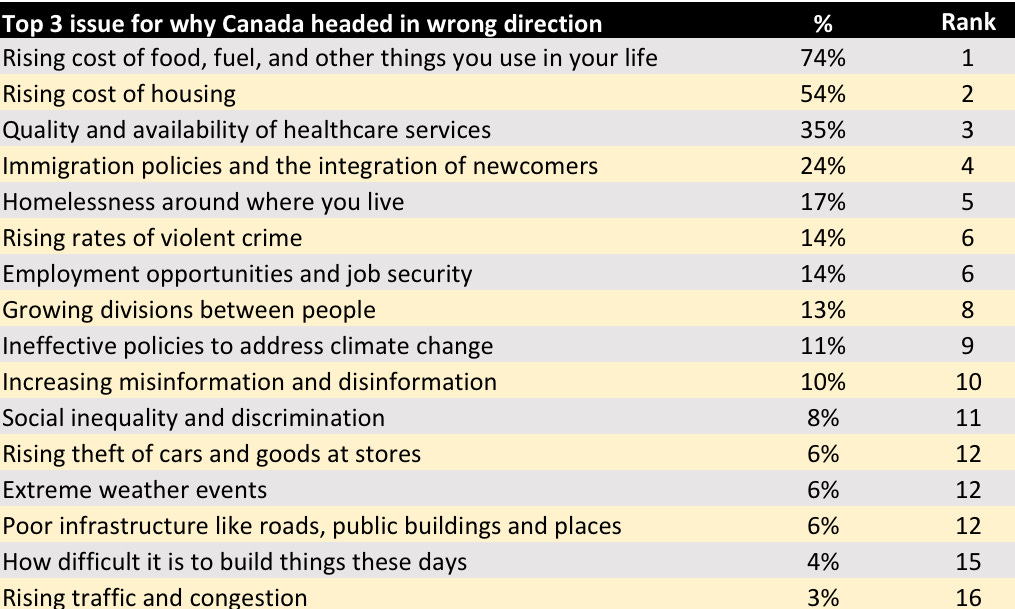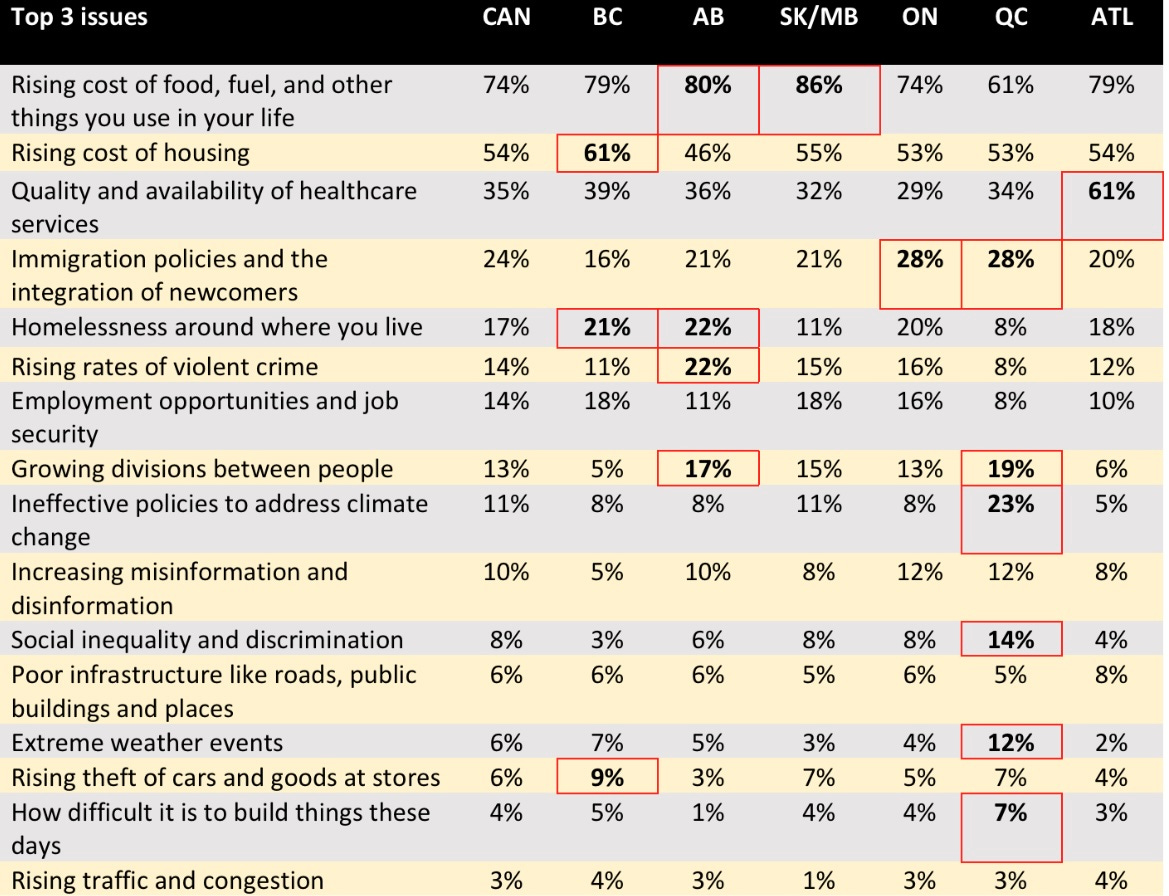What can governments do to get back on the right track?
Too many feel Canada is headed on the wrong track. Understanding why this is and how people measure progress is key to success in the next year. Our results suggest the cost of food and fuel are top.
By: Tyler Meredith and Ken Boessenkool
To mark our first full year in business we wanted to understand a key theme that is at the heart of Canadian politics today: why do so many people feel Canada is broken? On the surface, things appear to be going ok – unemployment is low, inflation is coming down and we may actually engineer a soft landing.
Yet, for so many, both in Canada and around the world, it doesn’t feel this way. And incumbents nearly everywhere are paying the price.
Simply noting that people feel aggrieved isn’t sufficient for how you do public policy or practice politics. You have to understand why that is, and how people might judge progress against their stated concerns.
In collaboration with Abacus Data, MB Policy sought out to answer these questions by giving Canadians both an open-ended and structured way to tell us why they think Canada is headed on the wrong track (if at all).
Methodology
From December 7 to 13, 2023, Abacus interviewed 1,919 Canadians. The margin of error for a comparable probability-based random sample of the same size is +/- 2.3%, 19 times out of 20. The data were weighted according to census data to ensure that the sample matched Canada’s population according to age, gender, educational attainment, and region. Totals may not add up to 100 due to rounding.
Liberals are optimistic, but most Canadians are not
About 60 per cent of Canadians say Canada is headed on the wrong track, compared to just 1 in 4 who say it is headed on the right track. As you will see in figure 1, the proportion of people who think Canada is on the right track is down, on a relative basis, forty per cent since the last election.
Though there are many factors and events at play, we believe this is correlated with interest rate moves. Optimism has been on a slow and persistent decline since the Bank of Canada began its rate-hiking cycle in March 2022 – a tightening of financial conditions that has been among the fastest and sharpest in the post-war period and among the heaviest responses to a given level of inflation in the G7.
Figure 11
This decline in optimism is widespread, and evident in nearly every region and among every demographic group in the country. Except among Liberals.
What is perhaps most interesting is what has happened to Liberal voters and near-Liberal voters. Those who voted Liberal in the last election are evenly divided – with 43 per cent apiece saying Canada is headed on the right or wrong track. Among current Liberal voters, the outlook is more optimistic, with nearly 60 per cent saying Canada is doing well.
Considering that Liberal support has declined by about five to seven points since the last election, most of which has come in the last six months – this would suggest that those who have left the Liberal coalition are those who are most likely to be skeptical about the country’s future. Recapturing a sense of optimism about how things are going today, both objectively and subjectively, is key for a government seeking its fourth term in office.
Table 22
To get at this, we zeroed in on the 61 per cent of people who said Canada was on the wrong track, to get them to be more specific about why that is.
First, we gave respondents an opportunity to answer this question in their own words, without the aid of any pre-structured choices. Over a thousand respondents provided an answer to the following question: “Earlier you said you think Canada is headed off on the wrong track In about 5 words, why do you think things in Canada are off on the wrong track?”
As you can see from the following word cloud, the most common set of response are clearly associated with “cost of living” pressures, which was mentioned by about 1 in 5 people. Some of these answers were associated with obvious things like housing and food, but in many other cases, respondents articulated a general sense that prices themselves are just too high. This may suggest that even as inflation comes under control – i.e. the rate of change comes down – people may not be satisfied by the new, higher price level of certain items.
Figure 3
About 18 per cent of respondents mentioned some combination of the Prime Minister’s name or the Liberal Party. While we have not done any significant disaggregation of these results, this likely reflects the intensity of views among those who are already opposed to the government, something which the Prime Minister recently told Susan Delacourt he is well aware of.
Debt and deficits did not register for many respondents, only being mentioned unprompted in about 4 per cent of cases. “Crime” was also only mentioned about 4 per cent of the time.
Interestingly, there was a notable absence of nearly any mention of geo-politics or global events. Less than 2 per cent of respondents mentioned these type of issues. In the small number of instances where it was raised unprompted, often respondents were doing so to complain about a perceived excessive cost or role on the part of Canada in providing aid (e.g. to Ukraine).
For all the effort Pierre Poilievre has put in to branding himself around “axe the tax”the word “tax” only came up about 4 per cent of the time, correlated mostly with the same people who complained about overall fiscal policy and a general perception that regulations are too burdensome.
By comparison, about twice as many people expressed concern about the general state of the economy or their job, and slightly less identified the state of the health care system as the reason they feel discouraged about life in Canada today. Solving these issues would appear to be of greater importance and urgency for Canadians.
When given a choice, the cost of food and fuel outrank housing as a leading concern for most Canadians
In the second part of the survey we asked respondents to choose from a list of 16 different things for which they might be frustrated, and pick the top 3 issues or indicators that best explains why they think Canada is headed in the wrong direction.
At the top of the list, by a wide margin, was the cost of household essentials, in particular food and fuel. This outranked housing affordability by a significant margin, though it was the second most frequently identified concern. It was the top ranked concern in every region of the country, and it wasn’t even close.
Figure 43
Health care, and to a lesser extent, immigration rounded out the top tier of concerns for Canadians. The latter is a reminder that although media coverage and opinion columnists have focused a lot of late on the potentially significant implications of a surge in immigration levels – which is clearly a rising concern for many Canadians – the general state of the health care system is a much more salient issue for voters who want change.
Concern with respect to health care was present everywhere but was the number two concern in Atlantic Canada, displacing housing. Concern for health care was lowest in Ontario, so much so that immigration nearly outranked it for third place. This is the only area of the country where immigration rises to potentially touch a top three issue.
Figure 54
A few other key observations from the data:
Housing concerns are most pronounced in B.C., with every other region essentially registering a similar degree of frustration. The consistency in results across the country, despite how much more pronounced affordability issues are in a few places may reflect how widespread this issue has become since interest rates have risen.
There are a significant number of second-tier issues that could potentially bubble up for policy-makers, notably crime and homelessness. Both issues rank high in the minds of Albertans and residents in the Saskatchewan and Manitoba in particular, but are also notable across most of the country, except Quebec.
Climate change was not a high-ranking concern for most respondents, although it remains regionally significant in Quebec. We separately tested responsiveness to climate adaptation and mitigation issues, because we wanted to see if the increasing frequency of wild fires, floods and other catastrophic weather events over the last several years has played a unique role in how people think about these issues.
Mitigation – and the need to be more effective in reducing emissions and solving global warming – still outperforms adaptation by an almost two to one margin, although adaptation concerns are also highest in Quebec. It is interesting that recent catastrophic weather events in Alberta and Atlantic Canada have not yet pierced public consciousness there in terms of this reaching a high priority issue in people’s minds. Here again, the issue was more often ranked as a top 3 issue by Quebecers than in any other region.
The recent announcement at this week’s cabinet retreat of an upcoming national summit on auto theft corresponds to a massive rise in reported thefts since COVID-19. Interestingly, this has been cast in media reports as an issue of concern in Ontario (where thefts have been high in the GTA), although public perception seems to be most attentive to this issue in B.C.
Misinformation and disinformation was listed by about 1 in 10 Canadians as a primary reason why Canada feels headed in the wrong direction. Although this may appear low, in the unaided section of our survey, a few respondents openly pointed to the toxicity of politics as a problem, which may be what people associated misinformation with.
The feeling of division is more readily apparent in both Quebec and Alberta, although remains at most a sixth or seventh ranked concern in those areas. What is driving this requires more study, but notably in Quebec a similarly large number of people also listed social inequality as a concern.
Despite growing difficulties and delays in getting big infrastructure projects completed, from the Trans Mountain pipeline to the Ellington crosstown transit line in Toronto, very few Canadians are concerned about this issue, with only 4 per cent ranking it a top three concern about their outlook on Canada.
Perhaps surprisingly, Quebecers were far more concerned about this issue, by a factor of almost 7:1 compared to Albertans. And among voting groups, this concern is highest among Liberal voters, at 12 per cent.
It is important to note that the results presented above focus on a “top 3” selection, meaning it requires the respondent to tell us only what they see as the highest priority issues. Issues which rank outside of this “top 3” frame may still be seen as important to deal with, but less so in relation to others. The choice of top 3 is itself critical for policy makers to bear in mind. With limited time and resources to deploy before the next election, it is crucial to focus on a few key things that can meaningfully change public sentiment about how Canada is doing.
From our data, there is a clear message about the importance of addressing the cost of food and other key day to day household budget items, even more so than housing.
Given that far more effort has been placed of late on housing – understandably and importantly – this might suggest a need for swifter policy action by responsible Ministers.
In a separate question we asked respondents to rank each issue on its own from 0 to 10 in terms of how critical they see it as an issue. More on that soon.
In a subsequent post we will explore these and other results, including how issues vary in perception across past and current voting intent, and we will discuss what all this might mean for a policy agenda heading into Budget 2024 and the winter / spring parliamentary session.
2021 and 2022 data points drawn from national Abacus polling (www.abacusdata.ca). December 2023 drawn from: MB Policy / Abacus national survey of Canadians, December 7 to 13, 2023
MB Policy / Abacus national survey of Canadians, December 7 to 13, 2023. Weight with vote: total n = 2417
Ibid
Ibid








